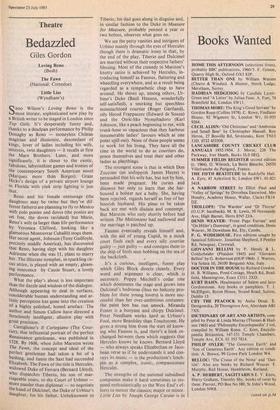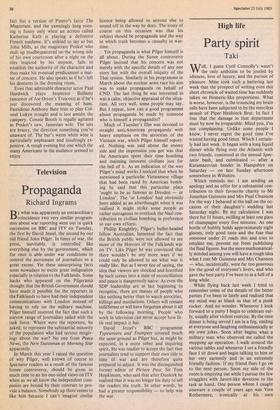Theatre
Bedazzled
Giles Gordon
The Fawn (National: Cottesloe) Little Lies (Wyndham's)
Snosy Wilson's Loving Reno is the most literate, sophisticated new play by a British writer to be staged in London since Top Girls. It's desperately funny and, thanks to a deadpan performance by Philip Donaghy as Reno — moneyless Chilean magician and illusionist, descendant of kings, lover of ladies including his wife, mistress, twin daughters — it recalls at first the Marx Brothers. Later, and more significantly, it is closer to the exotic, fabulous, labyrinthine games and ironies of the contemporary South American novel (Marquez more than Borges). Grant Hicks's design of a private airport lounge in Florida with pink strip lighting is just that
Reno and his female entourage (the daughters may be twins but they've dif- ferent fathers) are planning to fly to Mexico with polo ponies and doves (the ponies are set free, the doves ravished) but Marie, Reno's wife (a larger than life performance by Veronica Clifford, looking like a glamorous Montserrat Caballe) stops them. Her secret agent, Johnson (Tony Guilfoyle, precisely middle America), has discovered that Reno, having slept with his daughter Adrienne when she was 1I, plans to marry her. The illiterate nymphet, in sparkling cir- cus attire, is played with an empty, gleam- ing innocence by Cassie Stuart, a lovely performance.
What the play's about is less important than the dazzle and wisdom of the dialogue. Although appearing to deal in surfaces, considerable human understanding and ar- tistic perception has gone into the creation of a highly polished, honed artefact. The author and Simon Callow have directed a ferociously intelligent, allusive play with great precision.
Castiglione's II Cortegiano (The Cour- tier), that influential portrait of the perfect Renaissance gentleman, was published in 1528. By 1606, when John Marston wrote The Fawn, the concept and ideal of the perfect gentleman had taken a bit of a bashing, and Jamie the Saxt had succeeded Elizabeth. The Fawn of the title is Hercules, widowed Duke of Ferrara (Bernard Lloyd), who dispatches Tiberio, his son of mar- riageable years, to the Court of Urbino — more pander than diplomat — to negotiate the hand of Dulcimel, the Duke of Urbino's daughter, for his father. Unbeknownst to Tiberio, his dad goes along in disguise and, in similar fashion to the Duke in Measure for Measure, probably penned a year or two before, observes what goes on.
We see the petty vanities and intrigues of Urbino mainly through the eyes of Hercules though there is dramatic irony in that, by the end of the play, Tiberio and Dulcimel are married without their respective fathers' blessing. Most of the comedy in Marston's knotty satire is achieved by Hercules, in- troducing himself as Faunus, flattering and wheedling everywhere, and as a result being regarded as a sympathetic chap to have around. He shows up, among others, Ur- bino's Duke (Basil Henson, wonderfully self-satisfied), a smirking but speechless moustachioed courtier (Roger Gartland), oily Herod Frappatore (Edward de 'Souza) and the Osric-like Nymphadoro (Karl Johnson, like a peach beginning to rot, with trunk-hose so capacious that they harbour innumerable ladies' favours which at one point spill out). None of these people seems to work for his living. They have all the time in the world to do as courtiers do, preen themselves and treat their and other ladies as playthings.
The strongest scene is that in which Don Zuccone (an unfoppish James Hayes) is persuaded that his wife has, but not by him, been made pregnant. He curses and disowns her only to learn that she har- boured a bolster not a baby. She, having been rejected, regards herself as free of her boorish husband. His pleas to be taken back are met with disdain and contempt. But Marston who only shortly before had written The Malcontent had mellowed and the marriage is patched up.
Faunus eventually reveals himself and, with the aid of young Cupid, in a mock court finds each and every silly courtier guilty just guilty — and consigns them to the ship of fools seen bobbing on the sea of the backcloth.
It's a curious, intelligent, funny play which Giles Block directs cleanly. Every word and argument is clear, which is necessary. Poppy Mitchell's cedar tree which dominates the stage and grows into Dulcimel's bedroom (thus no balcony pro- blem for these young lovers) is more suc- cessful than her over-ambitious costumes: the paint box has run amock. Miranda Foster is a buoyant and chirpy Dulcimel. Peter Needham works hard as Urbino's Fool, more Beardsley than Touchstone. He gives a strong hint from the start of know- ing who Faunus is, and there's a look ex- changed between them which suggests that Hercules knows he knows, Bernard Lloyd — who always speaks Elizabethan or Jaco- bean verse as if he understands it and con- veys its music — is the production's lynch- pin as a complex, ironic, compassionate Hercules.
The strengths of the national subsidised companies make it hard sometimes to res- pond enthusiastically to the West End's ef- forts to mount the classics; major or minor. Little Lies by Joseph. George Caruso is in
fact but a version of Pinero's farce The Magistrate, and the yawningly long even- ing is funny only when an actress called Katherine Kath is playing a definitive French madame. It's unkind to say so but John Mills, as the magistrate Posket who ends up mudbespattered on the wrong side of his own courtroom after a night on the tiles inspired by his stepson, fails to establish the authority of the character and thus make his eventual predicament a mat- ter of concern. He also speaks as if he's left his dentures in the dressing room.
Even that admirable character actor Paul Hardwick plays Inspector Bullamy (ancestor of Joe Orton's Truscott) as if he's just discovered the meaning of ham. Fastidious Anthony Bate tries to play Col- onel Lukyn straight and is lost amidst the campery. Connie Booth is regally agitated as Posket's new, Jamesian wife. The sets are brassy, the direction something you're unaware of. The bar's warm white wine is particularly unpleasant and insultingly ex- pensive. A rough evening but one which the many Americans in the audience seemed to enjoy.







































 Previous page
Previous page